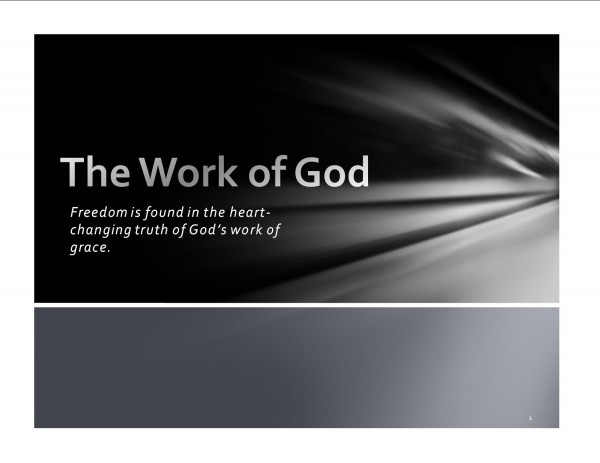Current brain research is invigorating, as it inspires us to acknowledge the amazing circuitry of our minds. The neuronal pathways spanning the various parts of the brain are employed tirelessly by the God that made them. It is estimated that the human brain contains as many as one hundred billion neurons, each neuron sprouting delicate dendrites, and transmitting impulses through appendages called axons. Jesus is Lord over all this gray and white matter. As Christ holds together all created things (Colossians 1:17), so He allows and ensures each synaptic connection.
Incredibly, God had full understanding of brain function in mind when He instructed His people in the Old Testament. The people to whom He spoke were most likely not pondering at the time the inner functions of the brain, but their Creator spoke to them with dignity – holding reality in the palm of His hand. The Bible is not archaic; it is accurate. Its words were spoken and recorded in the context of the existing culture. Looking back, we can see that the ultimate Author of the Bible is truly the Maker of the brain. Thankfully, the Hebrews took God at His Word, no matter what they did or did not understand of the mind’s inner workings. We should also immediately trust God’s Word, knowing science will always “catch up” with the timeless truth of the Bible.
Let us explore the fascinating intricacies of Deuteronomy 6:5-9 in light of current brain analysis. First, we recall the passage: “Love the LORD your God with all your heart and with all your soul and with all your strength. These commandments that I give you today are to be upon your hearts. Impress them on your children. Talk about them when you sit at home and when you walk along the road, when you lie down and when you get up. Tie them as symbols on your hands and bind them on your foreheads. Write them on the doorframes of your houses and on your gates.” (NIV)
God first proclaims that He intends we love Him “with everything we’ve got”! I call to your attention particularly the phrase, “with all your strength.” The Hebrew root implies that we ought to love our Lord to the highest degree, with force, with abundance, and exceedingly so. Following on the heels of this great commandment is its corollary: all the precepts God gives to us are to be upon our hearts. In other words, our love for Him will come to fruition as we actually treasure God’s Word at our core. The Hebrew term to designate our heart in this instance is a concept implying that God’s commandments are to reside in our inner being, our mind, or our soul. The nuance tells us that the Word of God should be part of our thinking and our memory; it becomes fluid in our conscience and is present at the seat of our emotions. When His Word inculcates our minds at this level, it becomes natural, for example, to speak of Isaiah 40:26 when looking into the night sky. Instead of simply seeing stars, we are now pondering the mighty God who sustains each one with precision and intention.
In fact, the flow of God’s Word in my conscience prompted a wonderful conversation about Isaiah 40:26 with my eleven-year-old nephew as we sat casually under a starry sky in the summertime. Verses that had become a fluid part of my mind through memorization, study, rehearsal, and application, suddenly cascaded into the moment at hand. This is as it should be, for God is the Lord of everything. The natural points to the supernatural (Romans 1:20), and proper training of the mind is obedience, and can lead to yet more obedience. In this case, the human interaction and discussion of God’s power and care for the stars led to an opportunity to express the even more unbelievable care of God for people made in His very own image. My nephew loved looking at stars, and this was a perfect opportunity for God’s Spirit to work through what had become a part of my mind’s wiring.
As the Lord continues His directives, we realize that we are to impress His Word on our children and talk about His commandments continually – while rising, walking, sitting at home, and lying down. Could God have made His intention of repetition and discussion of His Word any more clear? In effect, He declares, “Keep doing this. Talk about Me always, in many contexts and in many ways. Over and over and over again I want you to rehearse and discuss My Word – especially with the younger ones.”
Guess what brain research has revealed? Brain growth continues past birth! When we actively rehearse and learn in different ways – stimulating various regions of the brain – we can expand and strengthen neuronal pathways. We can make it easier to recall information readily. As Willis (2006) noted, “The brain pathways and connections that are used regularly are maintained and ‘hard-wired,’ while others are eliminated, or pruned.”
It seems God would desire His law be the hard-wiring of our brains. For my actions and reactions to be healthy, the very Word of God needs to be part of the structure of my mind. Willis (2006) informs, “New connecting cells, called dendrites, can be formed throughout life . . . after repeated practice, working memories are set down as permanent neuronal circuits of axons and dendrites ready to be activated when the information is needed.”
God rightly requires us to “impress [the commandments] on [our] children.” The word “impress” here means to sharpen or whet, as a knife. One nuance implies a wounding or piercing through. Our children and all young ones under our influence ought to feel the emotional, deep piercing of God’s Word. This is not simply an intellectual experience. His Word – when practiced – pricks our soul in ways unimaginable.
I will never forget the penetration of my heart while watching my grandmother die. The summary of those final days in her bed could be, “She drew unbelievably close to Jesus as her outer shell fell away.” I observed a woman of God as all her belief and obedience culminated in glorious moments.
I was pierced through in a simpler moment when the practice of genuine forgiveness led to a feeling of victory and love. The bottom line is that reinforcement of God’s Word as gained in the practice of the principles that have been purposefully hard-wired in our minds leads to deeper understanding and easier retrieval. Current research refers to this as episodic memory and experiential learning. Willis (2006) asserts, “With strategies that engage the senses, students ‘become’ the knowledge by interacting with it. As a result, a new memory that might otherwise be forgotten is linked to a sensation, a movement, or an emotion, and therefore it travels into the memory storage in more than one pathway. This redundancy of pathways means greater memory retention and recall.”
It is no wonder that the Lord demands we ponder His Word in the daily experiences of life. When my mind is fresh in the morning and the world is new, when the quietness of the evening settles in, when walking through the events and relationships of the day, and all times; my musing on His commandments must mix with the occurrences of my life. I need to observe His Word as it relates to all the circumstances I encounter. Behind the scenes, my Creator-God is firing neurons in all the lobes of my brain, hard-wiring me for increased focus on Him.
God adds that His people ought to “write [the commandments] on the doorframes of [their] houses and on [their] gates.” I will here focus on the fact that the people ought to manually write God’s Word. In our brains, the occipital lobe is involved with reading and visual perception; the parietal lobe relates to tactile perception and academic skills; and the frontal lobe is involved with consciousness and attention. Since the Hebrews had a largely oral culture of communication (directly involving the temporal lobe), it is of note that God directed His people to engage all four lobes of the brain in regard to His Word. He obviously desires that all our mind engages.
Interestingly, when referring to students’ study of electrons orbiting a nucleus, Willis (2006) recommends, “If they then draw a sketch of their visualizations and verbally communicate them to partners, or write about them in their own words, multiple brain pathways will be stimulated to enter long-term memory.”
Whether taken literally or symbolically, God clearly advises the Hebrews to “tie [the commandments] as symbols on [their] hands and bind them on [their] foreheads.” The root for the term “forehead” is “frontal.” The frontal lobe of our brains is the epicenter of attention, motivation, guidance of social behavior, judgment, and decision-making. The Lord means for His Word to be right there at the headquarters of our motivation. Let everything be driven by Him.
As we begin to contemplate current brain research, we notice that God is never “behind the times.” He stands omniscient and outside of time and space. Though God inspired the writing of Deuteronomy approximately 3,500 years ago, its words are accurate and align with the latest brain discoveries. At the risk of sounding simplistic, I must say that the Creator best knows the creation. Imagine, when God first created man, He did so giving us the most intricate and organized of bodies and organs. God knew all about branching dendrites and invaluable synapses, for He brought them into existence. We must always trust His Word, because our timeless God has given it to us freely from His unfathomable wisdom.
As we function, using the minds God has given us, may we always cling to John 14:26, for the Creator transcends the creation. Although the design and workings of the human brain point to the One who made them, the Lord is infinitely greater than us. His work cannot be fully captured in the study of created things. In John 14:26, Jesus says, “But the Counselor, the Holy Spirit, whom the Father will send in my name, will teach you all things and will remind you of everything I have said to you.” (NIV)
The Creator of our mind is infinitely greater than our mind. God sent His Holy Spirit to be our Teacher. God’s Spirit superintends the workings of my brain. The genuinely Christian perspective is one that makes a personal God central. God made me more than the sum of the neurons and cells of my body. God Himself is working in my heart and mind as I yield myself to Him. His Holy Spirit works through and above the astounding, intricate brains God has given to us. God chooses to work in us profoundly when we obey His Word, which naturally both aligns with and transcends the created world.
Thank you, Jesus, for giving Your life that the Holy Spirit might live in me so that I can obey God’s Word, using the brain He has given me!
Reference: Judy Willis, M.D. (2006) Research-based strategies to ignite student learning. Alexandria, VA: Association for Supervision and Curriculum Development.


